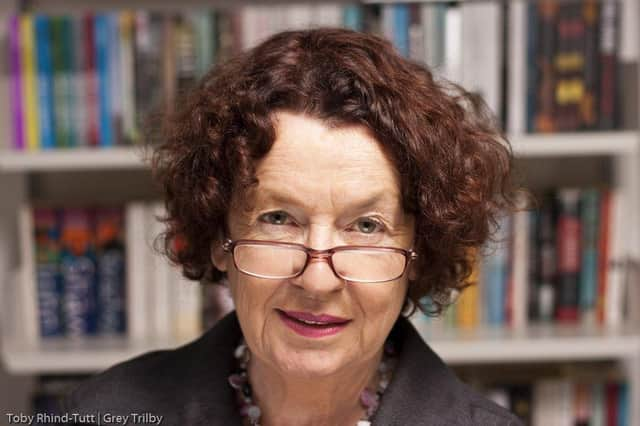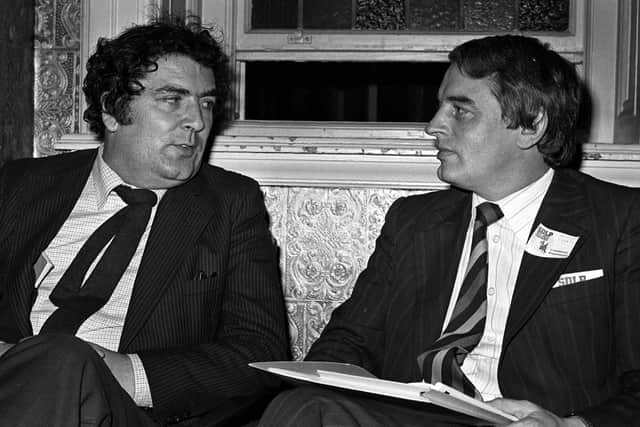Ruth Dudley Edwards: The SDLP should return to the moral clarity of Austin Currie


As his friend the UUP’s Lord (Ken) Maginnis said of him, “Austin was the fairest-minded man that I ever knew and ever worked with ... He had an eye to the future and could see beyond differences and knew what was important — housing and jobs”.
Maginnis and Currie had both been concerned about the unfairness of housing allocation at a time when sectarianism was rife in some local councils.
Advertisement
Hide AdAdvertisement
Hide Ad(For the record, in 1971 the American-born Richard Rose, Professor of Politics in the University of Strathclyde, investigated council discrimination in Northern Ireland and found none that was systematic, but — in a minority of both nationalist and unionist councils — individual cases of blatant discrimination.)


Famously, in 1968 in Caledon, Currie triggered the civil rights movement by squatting in a council house unfairly allocated to a single Protestant woman despite there being several large Catholic families on the waiting list.
An opponent of violence all his life, he would later say he would never have set the campaign in motion had he known the consequences.
The only person to have been a minister in governments North and South (respectively for the SDLP and Fine Gael), Currie was widely admired for his astounding courage in standing up to horrifying violence from both loyalists and republicans.
Advertisement
Hide AdAdvertisement
Hide AdHis house at Donaghmore, Co Tyrone, was known to his family as ‘Fort Currie’, having been attacked with guns and bombs — the most terrible episode being a sexual assault on his wife Annita, who was beaten unconscious and ‘branded’ on her breast by Ulster Volunteer Force brutes with the letters UVF.
At Currie’s funeral, his daughter Estelle spoke of her father having to keep a gun beside his bed and check under the car before taking his children to school. She spoke too of his incessant appeals to the IRA murderers who in 1975 killed Columba McVeigh.
“At every occasion he could, Daddy would call on the people who took Columba away, to do the decent thing, the Christian thing, of allowing him home to be buried with his family. The disappeared, still one of the cruellest and shameful atrocities of the Troubles and still something that could be put right.”
Far from being radicalised by the violence visited on him and his family, Currie never ceased to work for a Northern Ireland in which nationalists and unionists could reach an agreed peace.
Advertisement
Hide AdAdvertisement
Hide AdI still have a vivid memory of seeing him and John Hume — both well-lubricated after a conference in Virginia — having yet another angry argument about Hume’s disastrous decision in 1981 to prevent Currie from standing in Fermanagh and South Tyrone, thus leaving it open for Bobby Sands to win by a few hundred votes over the UUP and give a legitimacy to Sinn Fein that has undermined democracy throughout the island.
A few days before Currie’s death, the SDLP MLA and Policing Board member Dolores Kelly accused the RUC of institutionalised sectarianism, causing, as Ray Fitzsimons of the Northern Ireland Retired Officers Association put it, “gross offence” to a service that had prevented “murder and mayhem on an industrial scale and had brought to justice terrorists in equal measure from republic and loyalist factions”.
Was her demonisation extending to “the thousands of men and women who served the RUC from the Catholic community, many who lost family contact, who were shunned from within their own communities, who had to move homes because of the threat they then faced from within their own neighbourhoods, and were even denied the ability to play GAA, simply because they answered the call to save our community”?
That was bad.
Worse was when last week, in his weekly column, the usually reasonable Alban Maginness wrote of the RUC as “this sectarian police force”, and of how “Catholics saw the RUC as symbols of oppression, Protestants as custodians of nationhood”.
Advertisement
Hide AdAdvertisement
Hide AdA letter from the distinguished psychiatrist Dr Philip McGarry, who respects Maginness’ “lifelong commitment to democracy, justice for all and passionate opposition to all sources of violence” protested that while “the RUC was — inevitably — a far from perfect organisation, one can’t seriously discuss policing in Northern Ireland without referring to the 301 officers killed, the thousands injured, and the daily fear of potential death experienced by them, their spouses and children during 30 years of remorseless violence”.
Of course, he said, with heavy weaponry in use against them, they were as Maginness had written, “heavily armed and operating in armoured vehicles from fortified police stations”.
Should they have been patrolling south Armagh in family cars? And what of Catholic RUC officers of huge integrity like Chief Constable Sir Jamie Flanagan and Deputy Chief Constable Michael McAtamney.
The SDLP deserves admiration for its decades of opposing terrorism, yet as they fight Sinn Fein for the green vote there can show a worrying ambiguity.
Advertisement
Hide AdAdvertisement
Hide AdTime to rediscover the sheer moral clarity of Austin Currie, and, as Dr McGarry puts it, observe “the basic tenets of human decency... As a minimum this means acknowledging that the killing of your neighbour is, was and always will be, wrong and unjustifiable”.
• Ruth Dudley Edwards Nov 9: A draining Sunday along the border, then at Lyra film
• Other comment pieces below, and beneath that information on how to subscribe to the News Letter
• Henry McDonald Nov 15: NHS workers should be required to have Covid vaccines
Advertisement
Hide AdAdvertisement
Hide Ad• Ben Lowry Nov 13: Essays in 2010 about NI on its 2021 centenary foresaw province staying in UK but not change from within
• Owen Polley Nov 13: Woke theories on history, gender and race get ‘stormy applause’
• Peter Robinson Nov 12: Opinion polls matter, if questions are well-defined
• Patrick Roche Nov 11: Archbishop’s comments a moral indictment of unionism
Advertisement
Hide AdAdvertisement
Hide Ad• Esmond Birnie Nov 10: Increasing interest rate now could lessen pain down the line
• Kenny Donaldson Nov 9: Amnesty admission makes mockery of Irish legacy criticism of Britain
• Writers Oct 30: We probe Irish nationalist myths in our new book which defends the Union
• Other columns by Ruth click here
——— ———
A message from the Editor:
Thank you for reading this story on our website. While I have your attention, I also have an important request to make of you.
Advertisement
Hide AdAdvertisement
Hide AdWith the coronavirus lockdowns having had a major impact on many of our advertisers — and consequently the revenue we receive — we are more reliant than ever on you taking out a digital subscription.
Subscribe to newsletter.co.uk and enjoy unlimited access to the best Northern Ireland and UK news and information online and on our app. With a digital subscription, you can read more than 5 articles, see fewer ads, enjoy faster load times, and get access to exclusive newsletters and content.
Visit
now to sign up.
Our journalism costs money and we rely on advertising, print and digital revenues to help to support them. By supporting us, we are able to support you in providing trusted, fact-checked content for this website.
Ben Lowry, Editor